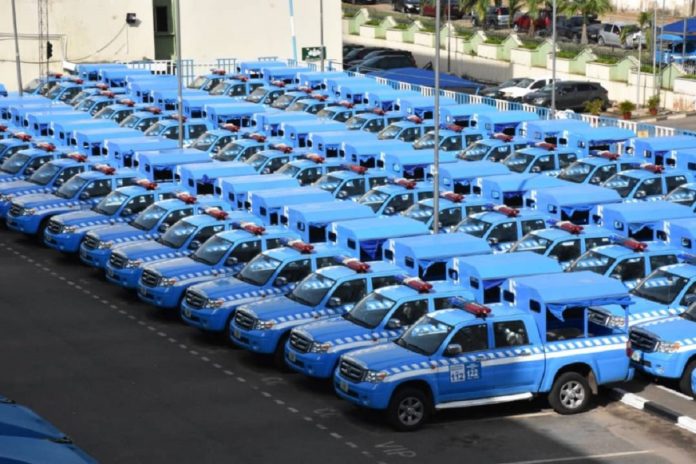The Ministry of Industry, Trade and Investment in
collaboration with the National Automotive Design and Development Council
(NADDC) has commissioned one billion dollars worth of locally-assembled
vehicles.
The vehicles are locally produced by 17 companies including
Coscharis, Nissan, Innoson, Ford and Elizade motors among others, that are
pioneering made-in-Nigeria vehicles
The Minister of Industry, Trade and Investment, Mr Adeniyi
Adebayo, while commissioning the Nigeria-produced and assembled vehicles on
Monday in Abuja said the vehicles would also later be used for “2020 Argungu
Motor Rally’’.
The first ever Argungu motor rally will be flagged off by
President Muhammadu Buhari in Abuja.
Adebayo said that although the rally was an integral part of
the Argungu Annual International Fishing and Cultural Festival, the NADDC had
plans to turn it into an annual event for the local auto industry in Nigeria.
He said that Nigeria was moving forward in the area of
automotive assembly adding that from zero production level in 2012 the industry
had recorded tens of thousands of newly assembled vehicles in the country.
According to him, with the inauguration of the 10-year
Nigerian Automotive Industry Development Plan (NAIDP 2013-2023) in 2013, about
62 companies have been registered to assemble vehicles.
The minister noted that the companies were registered to
assemble vehicles at both Semi Knocked Down (SKD) and Completely Knocked Down
(CKD) levels with a combined total installed capacity of 423,790 units.
He further said that an actual assemblage of 10,343 units
had been achieved so far while 31 automotive assembly companies were currently
listed under the Bureau of Public Procurement for patronage.
“The vehicles and brands for unveiling are a testament to
the zeal and commitment of the automotive industrial subsector to the present
government’s efforts towards diversification of the non-oil sector of the
economy.
“The role of the NADDC in reviving and sustaining the
automotive sector has greatly helped in stimulating growth and development in
Nigerian automotive industry,’’ he said.
He however urged Nigerians to patronise made-in-Nigeria
vehicles to create jobs, build capacity, drive investment, conserve foreign
exchange and transfer technology to the citizens.
In a remark, Amb. Mariam Katagum, Minister of State for
Industry, Trade and investment charged the auto companies to do more in the
area of local content and have faith in Federal Government’s commitment to
economy diversification.
Katagum, represented by the ministry’s Permanent Secretary,
Dr Nasir Gwarzo, said that the unveiling of the vehicles that were also slated
to take part in the Argungu Motor Rally showed what the Nigerian automotive
industry could offer.
NADDC Director-General, Mr Jelani Aliyu, in a remark said
that so far about one billion dollars had been invested by the auto companies
whose cars were being unveiled while 4,700 people were directly employed in the
sector.
He added that it set aside five billion naira towards a
single digit vehicle finance scheme and was talking with banks such as Zenith,
Wema and Jaiz to provide the financing for vehicles made in Nigeria.
According to him, the organisation is building three
automotive testing centres and three automobile service hubs across the country
to promote sustainability and maintenance culture.
The D-G said NADDC was saddled with the responsibility of
developing the local automotive sector to discourage the importation of fully
built vehicles in the country.
Aliyu said that with the signing of the Africa Continental
Free Trade Area (AfCFTA) agreement, it was committed to make Nigeria an
advanced hub of automotive production in Africa.
“Not just to build cars for 200 million people but to
support local producers by opening up for them market opportunities to the one
billion people of the African continent,’’ he said.
The NADDC boss expressed dissatisfaction that Nigerians
spent eight billion dollars to import 300,000 to 400,000 vehicles yearly into
the country, adding that a lot of money was at shores.
He further noted that a lot of those vehicles were old cars
while some were up to 20 years old constituting problems to the buyer.
“That is why we are implementing the NAIDP to promote vehicle
production in Nigeria with five cardinal elements around investment promotion,
market development, infrastructure development and standards.
“We are proposing incentives to discourage importation of
vehicles and encourage local production. We are putting forward a tax holiday
to give investors time on investment,’’ he said.
Mr Akani Dolapo, Chairman, House Committee on Industry, also
called for enabling law to back up enforcement of policy in the sector, adding
that without enabling law and collaboration investment would not thrive.
You may be interested

Arsenal Equal Chelsea’s London Derby Feat After 5-1 Win Vs Palace
Webby - December 21, 2024Arsenal equaled Chelsea’s London derby achievement following their 5-1 win against Crystal Palace in Saturday’s Premier League game at Selhurst…

Haaland Backs Guardiola To Turn Man City’s Poor Form Around
Webby - December 21, 2024Erling Haaland had said he and his Manchester City teammates are still backing manager Pep Guardiola to turn the team’s…

PSG To Reignite Interest In Osimhen
Webby - December 21, 2024Paris Saint-Germain have contacted Napoli to discuss signing Victor Osimhen in January, according to reports in France.It is reported that…


















![American Pastor, David Wilson Seen Eating The Box Of Woman Who Isn’t His Wife [Video]](https://onlinenigeria.com/wp-content/uploads/2019/10/american-pastor-david-wilson-seen-eating-the-box-of-woman-who-isnt-his-wife-video-150x150.jpg)









